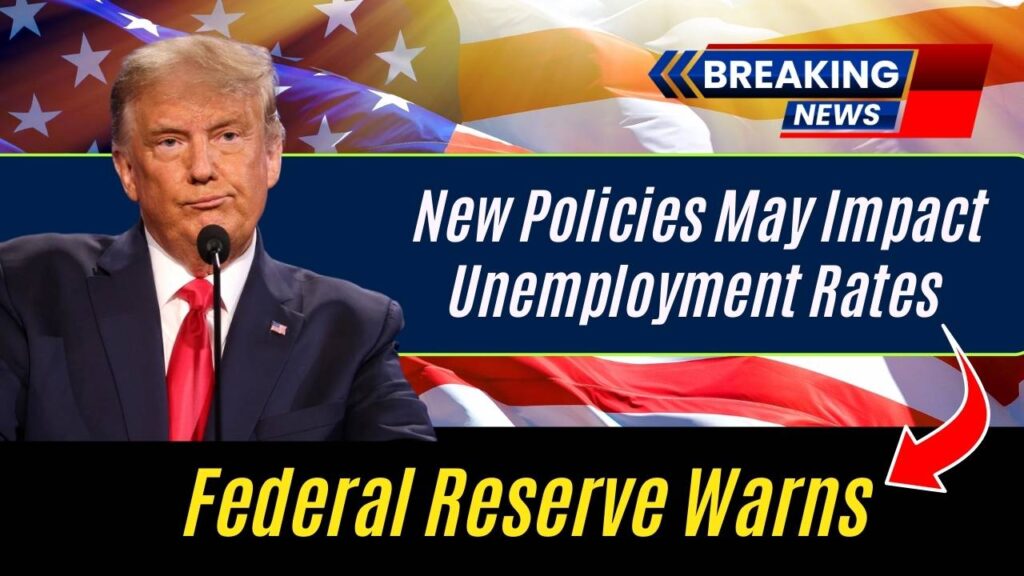Federal Reserve Warns – The Federal Reserve has recently issued a warning about how new policies could impact unemployment rates in the United States. As the economy navigates shifting regulations, interest rate changes, and fiscal adjustments, experts are raising concerns about potential job market instability. The Fed’s cautious stance underscores the need for businesses and workers to stay informed and prepared for possible economic shifts.

Federal Reserve Warns
| Topic | Summary |
|---|---|
| Federal Reserve’s Warning | New policies may lead to rising unemployment rates |
| Impact on Jobs | Certain industries may experience job cuts due to fiscal policies |
| Monetary Policy | Interest rate changes could influence hiring and business growth |
| Expert Insights | Economists predict potential slowdowns in specific job sectors |
| Affected Sectors | Manufacturing, retail, real estate, and government jobs at risk |
| Federal Reserve’s Role | Aims to balance inflation and employment stability |
| Official Source | Federal Reserve Official Site |
The Federal Reserve’s warning about new policies affecting unemployment rates is a wake-up call for workers and businesses alike. Interest rate hikes, trade policies, and government spending decisions will shape the job market in the coming months. Staying informed and adapting to economic changes will be essential for financial stability.
Final Thoughts
- Workers should focus on upskilling and diversifying income sources.
- Businesses should prepare for economic shifts by reassessing hiring strategies.
- Policymakers need to strike a balance between inflation control and job market stability.
What’s Causing Concern?
The Federal Reserve’s policies directly impact inflation, interest rates, and employment trends. Recent economic shifts, including potential rate hikes and government spending changes, have raised concerns about employment stability.
1. How Interest Rates Affect Jobs
When the Fed increases interest rates, borrowing becomes more expensive for businesses and consumers. This often leads to:
- Reduced business expansion: Companies delay hiring and investments.
- Higher loan costs: Small businesses may struggle with debt repayment.
- Lower consumer spending: Reduced spending can slow job growth in retail and services.
On the other hand, lower interest rates encourage borrowing and investments, potentially increasing job opportunities.
2. Government Policies and Workforce Impact
New fiscal policies, including tariffs, tax cuts, or spending freezes, may have mixed effects on employment:
- Public sector jobs: If federal or state spending is cut, government jobs could decline.
- Manufacturing and Trade: Industries reliant on imports and exports may face job uncertainties due to tariffs.
- Tech and Finance: These sectors often react to regulatory changes affecting investment and hiring trends.
- Real Estate & Construction: Rising interest rates can slow housing demand, impacting jobs in construction and real estate.
3. Industries Most Affected
Certain industries are more vulnerable to policy changes than others:
- Retail & Hospitality: Higher borrowing costs can reduce disposable income, leading to slower sales and job cuts.
- Healthcare: Although relatively stable, federal budget cuts could impact Medicare and hospital employment.
- Energy Sector: Government policies on fossil fuels, clean energy incentives, or regulations can affect employment levels.
Recent Data on Unemployment
According to the U.S. Bureau of Labor Statistics (BLS):
- The unemployment rate in February 2025 increased to 4.1%, up from 3.9% in December 2024.
- Job growth slowed, with only 151,000 nonfarm payrolls added, below economists’ expectations.
- The hospitality and retail sectors saw the largest decline in new hires.
For real-time updates, visit the BLS official site.
What Workers and Businesses Can Do
For Job Seekers
- Upskill and Reskill: Stay competitive by learning in-demand skills in technology, finance, and healthcare.
- Diversify Income Sources: Consider freelance work, side businesses, or online gigs to supplement income.
- Stay Informed: Follow economic reports and job market trends to anticipate changes.
- Consider Recession-Proof Jobs: Fields like healthcare, cybersecurity, and education tend to remain stable during economic downturns.
- Expand Your Network: Connecting with professionals in stable industries can help in case of job loss.
For Businesses
- Reassess Hiring Plans: Prepare for potential shifts in the economy and job market.
- Optimize Costs: Focus on efficiency to sustain operations without heavy layoffs.
- Adapt to Policy Changes: Work with financial experts to understand the impact of interest rates and regulations.
- Invest in Workforce Training: Encourage employees to develop new skills that align with industry trends.
- Diversify Revenue Streams: Companies that explore new markets or services may weather economic fluctuations better.
Expert Opinions
Economists from leading institutions, including the Federal Reserve Bank of New York, suggest that businesses and job seekers should prepare for a slower economy over the next 12 months. According to Dr. Emily Carter, an economic analyst at the Brookings Institution:
“While we are not expecting a severe recession, job seekers and businesses should be cautious about economic slowdowns affecting hiring patterns. Preparing now will help mitigate risks.”
FED’s 2025 Rate Cut: What Homebuyers & Investors Need to Know
Trump Tariffs 2025: Fed Analysis on Economic Impact and Inflation Control
Whose Portrait Is on the $50 Bill? Check Details About New U.S. Currency Bill
FAQs
1. Why is the Federal Reserve concerned about unemployment?
The Fed monitors employment as part of its dual mandate to ensure stable inflation and maximum employment. Sudden job losses can indicate economic slowdowns that require intervention.
2. How do interest rate changes affect hiring?
Higher interest rates increase borrowing costs, making businesses cautious about expanding and hiring new employees.
3. Which industries are most vulnerable to policy changes?
Manufacturing, retail, real estate, and public sector jobs often feel the impact first when economic policies shift.
4. What can I do if I fear job loss?
Stay proactive by improving your skills, networking, and exploring alternative job opportunities in recession-resistant fields like healthcare and technology.
5. What is the Federal Reserve’s role in job creation?
The Fed does not directly create jobs but influences economic conditions through interest rates and monetary policies to support job growth.







